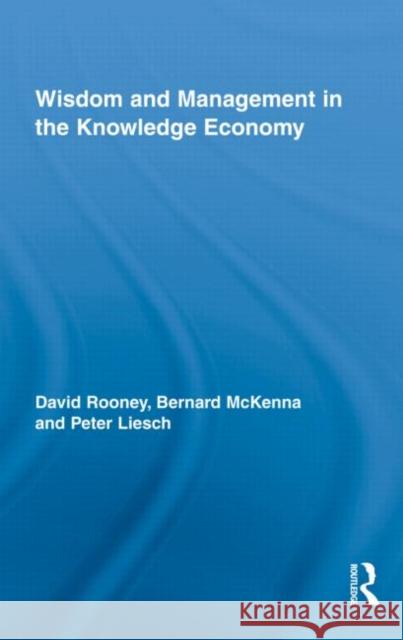Wisdom and Management in the Knowledge Economy » książka
Wisdom and Management in the Knowledge Economy
ISBN-13: 9780415445733 / Angielski / Twarda / 2010 / 260 str.
Wisdom and Management in the Knowledge Economy
ISBN-13: 9780415445733 / Angielski / Twarda / 2010 / 260 str.
(netto: 738,72 VAT: 5%)
Najniższa cena z 30 dni: 705,23
ok. 16-18 dni roboczych.
Darmowa dostawa!
Today there are more technology, technologists, knowledge and experts than at any time in human history; but from a global perspective, it is difficult to argue that this accumulation of knowledge and technology has put the world in an unambiguously better position than it was in the past. Business is not getting any easier to do and major corporate collapses based on poor decisions, poor conduct, and poor judgement continue to occur. In public administration too, basic institutions and services (education, health, transport) seem to be continually undergoing "crises" of inadequate delivery and excessive pressure. Wisdom and Management in the Knowledge Economy explains why unwise managerial practice can happen in a world characterized by an excess of information and knowledge. Drawing on Aristotle's idea of practical wisdom, the book develops a theory of social practice wisdom that addresses important social psychological and sociological dynamics that underpin wise management and organizations. As well as providing a detailed theory of social practice wisdom, this book considers practical issues in organizational communication, behavior, culture, change and knowledge as well as in HRM, leadership, ethics, strategy, international business, business education, and wisdom research. By introducing the notion of social practice wisdom, aspects of social structure, organizational culture, and organizational communication needed for wisdom to flourish are for the first time rendered visible in a way that opens new possibilities for wiser management, wiser organizations, and wisdom research.
It is difficult to argue that the accumulation of knowledge and technology has put the world in an unambiguously better position than it was in the past. Business is not getting any easier to do and major corporate collapses based on poor decisions, poor conduct, and poor judgement continue to occur. The problem, this book argues, is knowledge in the absence of sufficient wisdom.
This book explains what wisdom is to a management and research audience. The authors reinvigorate its proper use in daily management and work practice, and promote it as an important research topic. To do this they develop criteria for identifying wisdom, and demonstrate how it can be applied across a number of important management areas including knowledge, innovation and creativity management, change management, strategy, leadership, international business, HRM, communication management, and management education.











